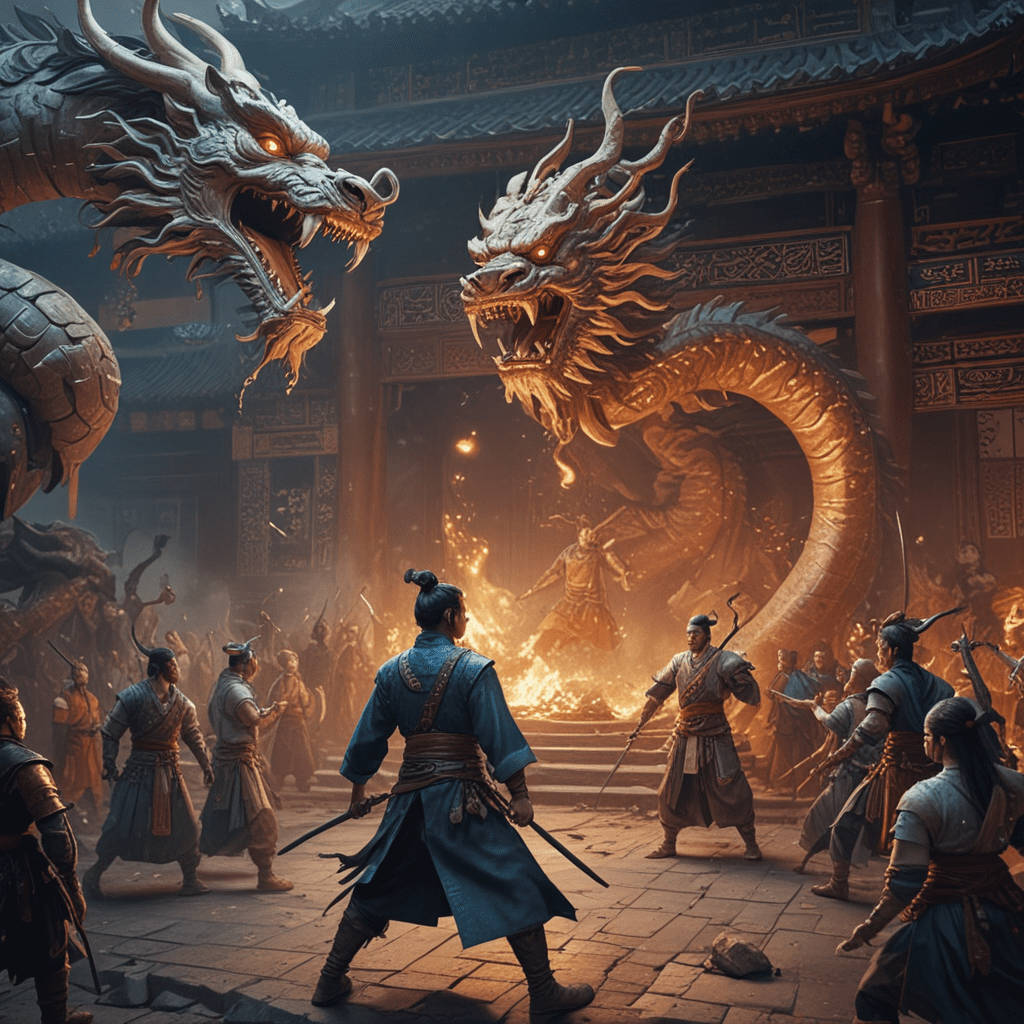Chinese Mythological Tales of Betrayal and Revenge
1. The Tale of Nüwa and Gonggong
Chinese mythology is a rich tapestry of captivating tales that recount the extraordinary feats of gods, goddesses, and mortals. Among these narratives, stories of betrayal and vengeance hold a prominent place, showcasing the consequences of broken trust and the indomitable spirit of those seeking retribution.
One such gripping tale is the story of Nüwa and Gonggong. Nüwa, the goddess of creation, molded humanity from clay and gave them life. Gonggong, the water god, was envious of her power and rose in rebellion against her. In the ensuing battle, Gonggong's defeat was so severe that he struck his head against Mount Buzhou, causing one of the pillars of heaven to collapse and the sky to tilt. Nüwa, using her magical abilities, repaired the pillar and saved the world from chaos. However, Gonggong's betrayal and subsequent punishment serve as a cautionary tale about the treacherous consequences of defying divine authority.
2. The Revolt of Hou Yi and the Theft of the Elixir
Hou Yi, a skilled archer who aided Emperor Yao in subduing the sun and moon, was rewarded with the elixir of immortality. However, his wife, Chang'e, stole the elixir and swallowed it, ascending to the moon as a goddess. Enraged, Hou Yi vowed revenge and attempted to storm the heavens. The gods, fearing his power, intervened and banished him to Earth, where he eventually perished.
3. The Betrayal of Xi Shi and the Fall of Wu
Xi Shi, one of the Four Beauties of ancient China, was sent as a spy to the state of Wu. Her stunning beauty captivated King Fuchai, weakening his resolve and distracting him from affairs of state. Xi Shi's treachery allowed the neighboring state of Yue, her homeland, to conquer Wu, leading to the death of King Fuchai. The story of Xi Shi highlights the destructive power of deception and the fragility of power when undermined from within.
4. The Vengeance of Wen Tianxiang
Wen Tianxiang, a loyal minister of the Song dynasty, refused to submit to the invading Mongols. Despite being captured and subjected to torture, he remained steadfast in his resolve. Before his execution, he composed a poem expressing his undying loyalty to the Song emperor. Wen Tianxiang's unwavering patriotism and the brutal price he paid for it have become symbols of resistance and national pride in Chinese history.
5. The Story of Yue Fei and the Traitor Qin Hui
Yue Fei, a brilliant general, led the Song dynasty army to numerous victories against the Mongols. However, he was falsely accused of treason by the corrupt minister Qin Hui. The emperor, fearing a coup d'état, ordered Yue Fei's execution. Qin Hui's treachery betrayed not only Yue Fei but also the entire nation, which was deprived of its greatest defender. Yue Fei's execution and Qin Hui's deceitful role in it have been etched into Chinese collective memory as a testament to the dangers of betrayal and the triumph of justice.
6. The Revenge of Zhao Wuxu
Zhao Wuxu, a renowned general during the Three Kingdoms period, suffered a grievous betrayal when his sworn brother Guan Yu was slain by his rivals, Sun Quan and Lu Meng. Driven by an unyielding thirst for vengeance, Zhao Wuxu rallied his forces and, with the aid of Zhuge Liang, launched a daring raid on Wu, capturing Guan Yu's murderer, Lu Meng. Zhao Wuxu's unwavering determination and skillful execution of his revenge became a legend, showcasing the lengths to which one can go to avenge the wrongs committed against those they hold dear.
7. The Legend of Xiang Yu and the Overlord's Farewell
Xiang Yu, known as the Overlord of Western Chu, fought valiantly against the forces of Liu Bang during the turbulent years leading up to the establishment of the Han dynasty. After suffering a series of defeats, Xiang Yu found himself surrounded and isolated. Refusing to surrender, he led his remaining troops into a desperate final battle, uttering his renowned "Overlord's Farewell" before engaging in fierce combat. Even in the face of certain defeat, Xiang Yu's indomitable spirit and tragic end left an indelible mark on Chinese history, inspiring awe and admiration for his unwavering resolve.
8. The Betrayal of Wu Zixu and the Fall of Chu
Wu Zixu, an advisor to the state of Wu, suffered a bitter betrayal when his father and brother were unjustly executed by the king of Chu. Vowing revenge, Wu Zixu fled to Wu and aided King Helü in defeating Chu, fulfilling his oath to avenge his family. However, Wu Zixu's triumph was short-lived, as he was later falsely accused of treason and executed by King Fuchai. The tragic story of Wu Zixu's betrayal and subsequent revenge highlights the complexities of loyalty, vengeance, and the fragility of power in ancient China.
9. The Tale of Daji and the End of the Shang Dynasty
Daji, the beautiful but malevolent consort of King Zhou, played a pivotal role in the downfall of the Shang dynasty. Known for her cruelty and debauchery, Daji's influence over the king led to rampant corruption and tyranny, alienating the people of Shang. Her actions eventually provoked a rebellion led by King Wu of Zhou, resulting in the end of the Shang dynasty and the establishment of the Zhou dynasty. The legend of Daji serves as a cautionary tale about the perils of unchecked power and the consequences of succumbing to evil desires.
10. The Legend of Lady White Snake
Lady White Snake, a mythical figure from Chinese folklore, embodies the transformative power of love and the enduring nature of betrayal. The tale revolves around a snake spirit who takes human form and falls deeply in love with a mortal man. Their forbidden romance is marred by a treacherous monk who seeks to destroy them. Through their journey, Lady White Snake's unwavering devotion is tested by betrayal and deceit, highlighting the resilience of love in the face of adversity.
FAQ
Q: What are the common themes found in Chinese mythological tales of betrayal and revenge?
A: Retribution, loyalty, consequences of broken trust, power dynamics, and the unwavering pursuit of justice.
Q: Who are some of the most iconic characters in Chinese mythology known for their betrayal and revenge?
A: Nüwa, Hou Yi, Xi Shi, Yue Fei, Qin Hui, Zhao Wuxu, Xiang Yu, Wu Zixu, Daji, and Lady White Snake.
Q: How do these tales reflect the cultural values and beliefs of ancient China?
A: They emphasize the importance of loyalty, honor, and the consequences of betrayal. They also showcase the enduring human desire for justice and retribution.



